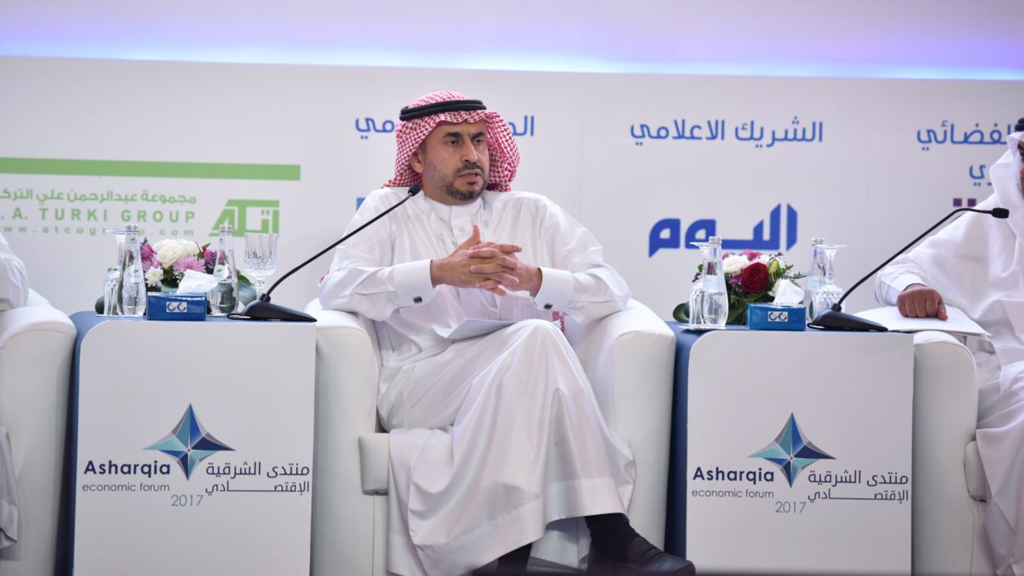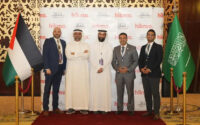Asharqia Economic Forum 2017

Saudi Aramco showcased today a strategic model for supporting the contracting industry at Asharqia Economic Forum 2017. The event kicked off on Wednesday evening at Sheraton Hotel in Dammam under the patronage of HRH Prince Saud bin Naif bin Abdulaziz, Amir of the Eastern Province.
The event promotes the industry’s partnership to foster the national economy and set the Kingdom on a sustainable growth trajectory while highlighting the policies and plans to drive the national economic base diversification as well as develop ways to meet the challenges faced by the industry.
Ahmad A. Al-Sa’adi, Senior Vice President of Technical Services, took part in a panel session titled “Construction sustainability opportunities: Mechanisms of support of the contracting business by major companies.” He pointed out that Saudi Aramco’s strategy to support the contracting industry, not only aims at meeting the company’s current and future business needs, but also demonstrates its keen efforts to instill the value of citizenship through effective contribution to fulfill Vision 2030. Al-Sa’adi presented a strategic model, which represents a continuation of Saudi Aramco’s efforts to support the Kingdom’s development trajectory especially at this time when all stakeholders are required to capitalize on all available capabilities and resources to ensure the fulfillment of Vision 2030’s goals and objectives.
Strategic model to support the contracting industry
In the panel discussion, Al-Sa’adi identified four key elements underlying the company’s strategic model to support the national contracting and construction industries.
First: Development of an integrated system for the management and execution of projects. Saudi Aramco has developed work mechanisms, management systems and methods and innovative practices to execute projects, including planning, engineering, supply chain management, and construction. For instance, Saudi Aramco, in cooperation with King Fahd University for Petroleum and Minerals, has set up a chapter of the Construction Industry Institute (CII) to serve as a platform for acquiring world-class experience and developing professional practices in this crucial sector.
In doing so, the company resorts to its rich legacy of technical, engineering and planning expertise and an integrated system handled by Project Management, a major Admin Area at Saudi Aramco.
Second: Developing and empowering Saudi professionals. The strategic partnership recently concluded with the Technical and Vocational Training Corporation (TVTC) resulted in establishing many specialized technical institutes such as Maharat Training and Employment Institute, Inspection Technology and Quality Assurance National Institute-ITQAN, the National Industrial Training Institute – NITI and Saudi Technical Institute for Oil Services, etc. Saudi Aramco is planning to continue its efforts to establish a total of 18 training centers and institutes across the Kingdom by 2020, as it is fully aware that the Saudization of quality jobs in this sector will have a positive impact on the national economy.
Third: Transferring, localizing and developing modern technologies and engineering consulting. In this respect, Saudi Aramco has played an active part in establishing fruitful cooperation relationships between world-class engineering companies and their counterparts in the Kingdom. Consequently, alliances have been formed to transfer and localize world-class engineering expertise and capabilities, to brush up Saudi engineers’ skills and to upgrade project performance criteria. As a whole, these efforts will bolster the objectives of the construction technology transfer and localization, which are part of 2020 National Transformation Program initiatives.
Fourth: Endorsing the contracting sector’s sustainability and development through realizing domestically sustainable growth of materials, and goods and services. Saudi Aramco has launched its In-Kingdom Total Value Add (IKTVA) program, which aims to double the current 35% sustainable growth of the domestic content of goods and services to 70% by 2021. Domestic content development will strengthen the credibility of the Company’s supply chain and further contribute to value creation, not only for the contracting sector but also for the national economy as a whole.
Al-Sa’adi noted that the contracting sector represents around 6% of Saudi gross domestic product with a business volume worth SR Billion 300-350. However, the challenges faced by this sector negatively reflected upon the performance of the projects. According to forecasts, the sector is approaching towards a steady growth to keep pace with the Kingdom’s industrial, service and housing expansion projects. This confirms the importance of supporting the sector by all development partners, particularly the Kingdom’s lead companies to ensure its development and the overcoming of challenges and obstacles.





 Email: info@cyber-gear.com
Email: info@cyber-gear.com